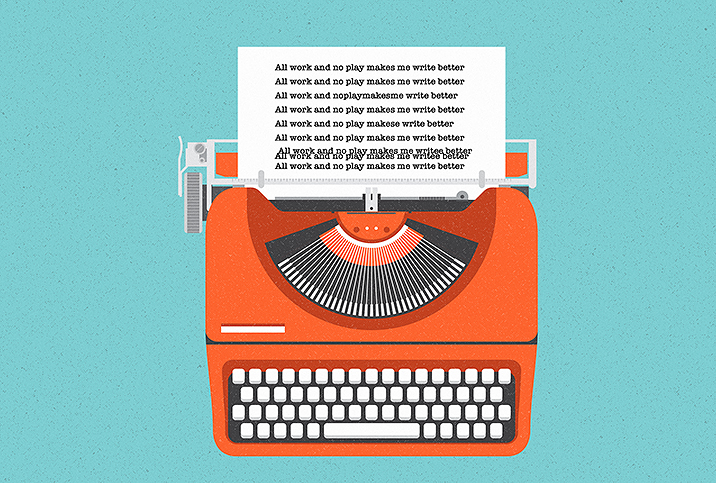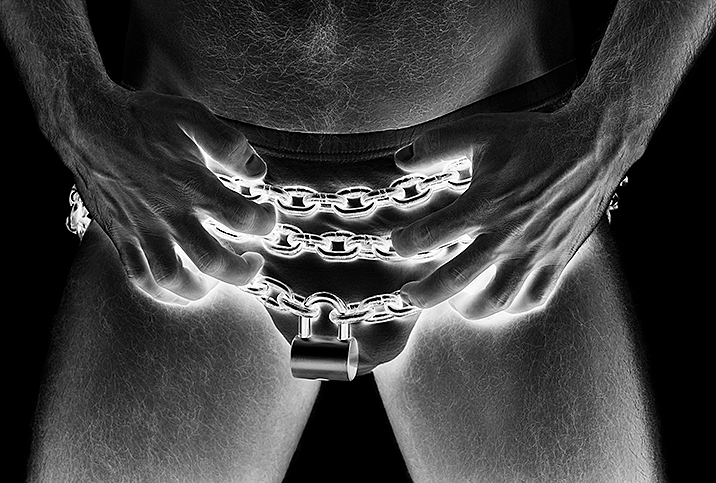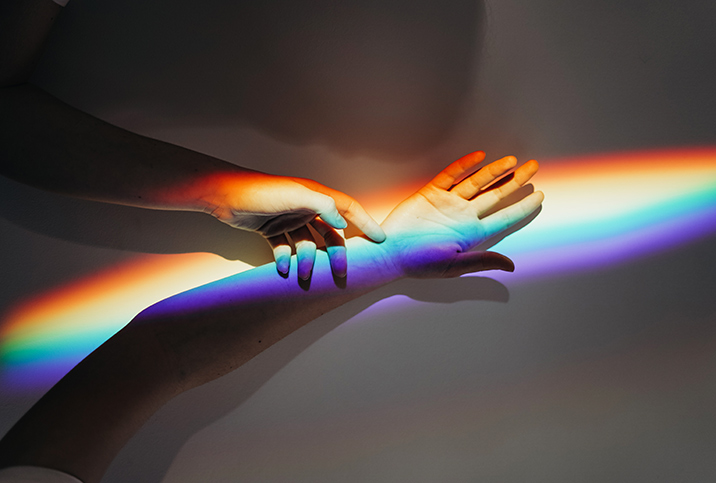What It's Like To Be a Celibate Sex Educator

At eleven o'clock, I pried apart my eyelids and unbound myself from twisted bedding. I washed my face, fed it and smoked a bowl on the balcony before making my way from that quiet cocoon onto New York City's bustling streets. As I walked down toward Canal, crossing over cobblestones, I mentally prepared for a long day of helping strangers have better sex. I loved my job at the sex shop, a longtime fixture of lower Manhattan, but lately it had been getting harder. By then, I'd been celibate for about six weeks.
I didn't know it at the time, but I'd joined a growing cohort of abstaining Americans. The portion of adults in the U.S ages 18 to 29 reporting having had no sex in the past year more than doubled between 2008 and 2018, according to a 2020 study published in JAMA Network Open. A so-called "sex recession" is well underway, linked in another recent study to a spate of social shifts for young adults, including a decline in alcohol consumption and increased coresiding with parents.
Knowing I wasn't alone in my sexlessness might have alleviated some of the shame and confusion I felt during the time I was celibate, which ended up totaling a year. My break began after a budding realization that most of the partnered sex I'd ever had could be placed on a scale from "not great" to "nightmarish," and I had no idea why. I loved fucking myself, having had a long and happy history of poking around PornHub, taking grainy nudes and, thanks to my job, building a small arsenal of sex toys. But I couldn't seem to re-create that same degree of pleasure and joy with a partner. So, finally, I decided to stop trying for a while.
It would have been tough regardless, but abstaining from sex when you talk about it for a living is a whole different matter. When couple after couple came into the store asking for advice about "spicing things up" in their sex lives, I felt like such a fraud. Teaching blowjob workshops when I could hardly remember the last time I'd seen an actual dick felt like lying to a roomful of people. Here I was, selling secrets to better sex, while my sex life languished behind the scenes.
I never doubted my decision to be celibate, and felt confident that my extensive job training and past experience still left me well-equipped to do my job. But even so, I often wondered, "Why should anyone listen to me?"
A disheartening debut
My journey to that strange situation was long and torturous, and started when I was young. I was 14 the first time I had sex, and I hadn't yet been told that sex and pleasure were linked. I'd sat through sex ed, where my peers and I were shown abstract diagrams of innards and were begged to use condoms, but never once were we told that sex should feel safe and good. Worse yet, girls were told that sex would actually hurt the first time, a prophecy fulfilled, in my case: All these years later, the blinding pain of being penetrated by a strange older boy, in an unaroused state and without a drop of lube, is my clearest memory of that night.
I'd eagerly awaited my sexual debut. Not because of the sex itself, but because I understood it as something that could buy me access to love. Raised in an era of "Girls Gone Wild" and analog celebrity sex tapes, I'd already internalized the sense that my worth as a girl, and eventually a woman, began and ended with how fuckable men deemed me to be.
The pressure to earn their affection had begun long before that hellish night on a freezing floor, and it only intensified afterward. I treated blowjobs like handshakes, and went even further with any guy who wanted to, each encounter putting more space between me and my own desires. Before long, my body couldn't tell the difference between the sex I'd sought out and the sex that sought me, like a heat-seeking missile. The nightmares and flashbacks struck me just the same.
The link between trauma and abstinence
Abstaining from sex following a traumatic sexual experience is not uncommon, but according to Los Angeles–based psychotherapist Elise Franklin, true celibacy is an active choice that's rooted in empowerment, not a reactive bodily response to a traumatic event. "I think of celibacy as a mindful choice not to share your sexuality or body with others," she said. "That's healthy if that's what someone truly wants, but that's not the same as responding to trauma."
Franklin used the analogy of deciding whether or not to reproduce: "It's the difference between thinking, I'm not having kids because I don't want to, it's not for me, and I'm not having kids because my parents fucked me up, and I'm scared I'll fuck my kids up."
By this measure, I'd characterize my experience with celibacy as both active and reactive. By the point I had stopped having sex, I'd been living with PTSD for so many years that I didn't know life—or sex—without it. It wasn't a specific trauma that inspired the shift, just the burgeoning knowledge that I had been traumatized, period.
But people choose celibacy for all kinds of reasons, not all of them trauma-related. They might have a distaste for hookup culture or want to explore novel types of intimacy in a relationship. Celibacy can even be a spiritual pursuit, like it was for Justin Bieber before his marriage to Hailey Baldwin. Regardless of what inspires it, many who experiment with abstinence find gifts in the process they weren't anticipating.
Celibacy as a superpower
At first I thought being a sex educator who didn't have sex was oxymoronic, and that eventually I'd fail at one pursuit or the other. But the longer it went on, the more I realized that each experience was informing the other, and that I was actually in an incredible position to recalibrate my entire relationship to sex. Through my brilliant colleagues, along with various books, workshops and other independent research (Bessel van der Kolk's "The Body Keeps The Score" was a game changer for me), I was constantly absorbing information that linked sexuality, somatics and trauma. As a result, I started to see my sexual history in a new light, which revealed deep wounds that demanded my attention—including the idea that sex was an indirect route to male approval.
During this process, I learned some incredible new things about myself. Once I was no longer laser-focused on getting attention from men, I learned that I preferred a different gender expression, and that I was probably demisexual. My sex toy collection taught me exactly what I liked and how to ask for it, and I discovered I sat a bit higher on the Kinsey scale than I'd previously assumed.
Most importantly, I learned I was more than comfy going for extended periods of time without sex, and that I wasn't wasting the prime of my life by not fucking as many people as possible. Once I was ready to have sex again, this knowledge made it better than it had ever been.



















Commentary